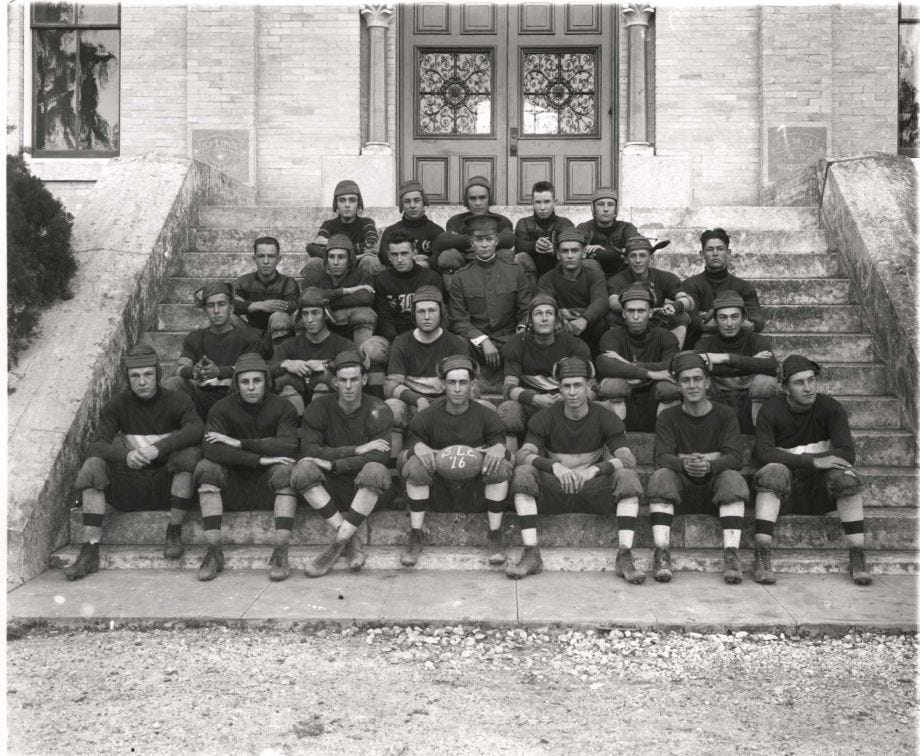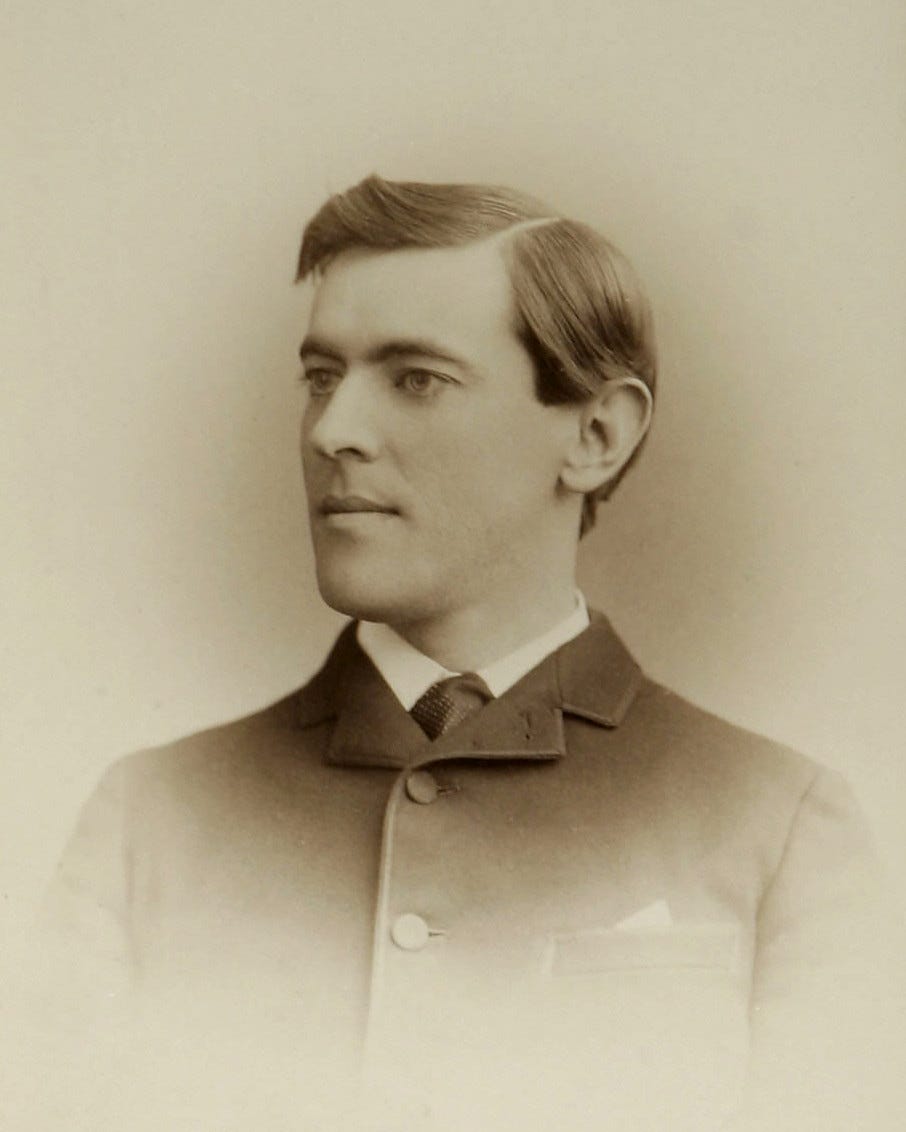Three College Football Coaches Who Became U.S. Presidents
The third Monday of February arrives in a few days, and with it comes the celebration of Washington’s Birthday, Washington and Lincoln Day, President’s Day, or Presidents’ Day, depending on the state doing the celebrating. I live in Michigan, which is the only state to celebrate Presidents Day (no apostrophe), so I’ll join my fellow Michiganders in honoring all who held the role rather than the policies or achievements of specific officeholders.
I’ll take a different spin on the Presidents Day theme to look at the three U.S. Presidents who coached college football prior to entering politics. I'll close with a quick review of how each President since Teddy Roosevelt was connected to football (or not).
I'd venture that few Americans could correctly name the three football-coaching Presidents prior to reading this posting. One of them was among the first to ever 'coach' football when the game was in its early days.
Woodrow Wilson
In Fields of Friendly Strife, I describe how then-President Wilson gave the go-ahead for the 1918 Rose Bowl and noted that his experience as the secretary of the football association at Princeton during his undergraduate days made him view football favorably. My understanding at the time was that Wilson handled the scheduling and financial matters for the team. I did not imagine he had a hand in on-the-field coaching. As it turns out, I was wrong.
Some of Wilson’s story may be a bit fanciful, but the world of college football was quite different in those days. Parke H. Davis provides some perspective. Davis was the national championship-winning coach at Lafayette in 1906 and his 1911 book, Football, America's Intercollegiate Game, was one of the first histories of the game. Davis noted that coaching was more informal during the 1800s and often amounted to alums coaching by committee. Any given alum might appear for a few days and return two weeks or a month later. In fact, the term ‘coach,’ did not arrive from Britain until the late 1880s, and the earliest use of the term “football coach” in a newspaper came in 1891. (“Baseball coach” appeared in newspapers three years earlier.)
As the story goes, Wilson saw his first football game at age ten, three years before the first intercollegiate game in 1869, so the game he witnessed was likely some form of folk game or a game played under rugby or soccer rules. He played baseball at Davidson before transferring to Princeton and was there in 1877 when Harvard challenged Princeton to a game. Previously, what we now consider college football was played under association or soccer rules, but the elite eastern colleges agreed in 1876 to play intercollegiate games under modified rugby rules. It turns out that Wilson was the only one at Princeton that understood rugby, so he was elected to the football board and helped ‘coach’ the team, in addition to handling the finances.
Wilson graduated from Princeton and wandered a bit professionally before earning a Ph.D. in History from Johns Hopkins. He then joined the faculty of Wesleyan in 1888, where he found a football team needing direction and, after volunteering his services, was elected the team’s faculty adviser. In effect, Wilson was the team coach before that term was used and before coaches controlled their teams as they have for the last century and more. Notably, under Wilson’s direction, Wesleyan had its best season in 1889, beating the likes of Penn, Lehigh, and Rutgers.
Wilson joined the faculty of Princeton in 1890 and sometimes worked with the football team for the next few years. Parke H. Davis, the football coach and historian mentioned earlier, was a freshman at Princeton in 1890 and recalled that Wilson was the first ‘coach’ he met on the practice field.
Of course, Wilson became Princeton’s President before being elected New Jersey’s governor in 1910 and U.S. President in 1914.
Dwight Eisenhower
The most accomplished coach of the bunch was Dwight Eisenhower. Eisenhower started at running back and linebacker at West Point during his sophomore year. (Ike is the third from left in the picture atop the page. Future Five-Star Genl. Omar Bradley stands second from right.) Ike was known as a hard hitter, and in West Point's 1912 game against the Pop Warner-coached Carlisle Indian School, Ike and another cadet hit Jim Thorpe hard enough to cause a fumble, but Ike sustained an injury later that year that ended his playing career.
After graduating in 1915, Lt. Eisenhower was ordered to Fort Sam Houston. He was soon asked to coach the nearby Peacock Military School and was reluctant to accept until the fort commanding officer convinced him otherwise. Ike led Peacock to a winning season and, the next year, took over coaching duties at St. Louis College (now St. Mary’s University). St. Louis had not won a game in five years, but Eisenhower’s coaching resulted in an about face, leading the team to a 5-1-1 record that year.

After WWI, Eisenhower coached at the top of the service football ranks during a time the top service teams competed with big-time college programs. In 1921, he led Camp Meade's Tank School team to the title in the Army’s Third Corps league and then formed a Corps all-star team to take on the Quantico Marines for the East Coast service championship. Before a crowd of 20,000 that included Vice President Coolidge, General John Pershing, and the Assistant Secretary of the Navy, Franklin D. Roosevelt, Ike’s team fell 20-0.
Eisenhower was stationed in Panama in 1924 when he was ordered back to the U.S. to be the Third Corps’ backfield coach, orders he complied with but did not desire. Prior to the 1924 service championship game, President Coolidge donated the sterling silver President’s Cup to present to the game’s winner each year. The Third Corps team once again met the Quantico Marines for the championship and fell hard, losing 47-0.
Eisenhower’s last known coaching stint came in 1926. By then, the Army had focused its competitive football efforts at Fort Benning in Georgia. Once again, Ike’s team took on the Marines, but the Devil Dogs bested Fort Benning, 27-7, so Mrs. Coolidge awarded the cup to the Marines.

Eisenhower became the Supreme Commander of Allied Forces in Europe during WWII, became the President of Columbia University in 1948, and was elected President in 1952.
Gerald Ford
Gerald Ford was the best football player among our Presidents. Ford started at center for Michigan during their 1932 and 1933 national championship seasons and was the MVP of the 1934 team. He landed spots in the 1935 East-West Shrine game and the College All-Star game versus the 1934 NFL Champion Chicago Bears. Intent on law school, Ford accepted positions as the boxing head coach and assistant football coach at Yale in 1935.
Yale went 19-5-1 and was nationally ranked during Ford's three years with the football team. Among the players coached by Ford at Yale were future U.S. Senators William Taft Jr. and William Proxmire. Ford entered Yale Law School in 1938 and graduated in the top third of his class in 1941.
After a short stint in private practice, Ford enlisted in the Navy following Pearl Harbor, serving in the Pacific. He was elected to Congress in 1949, rose to House Minority Leader in 1965, and became Vice President following Spiro Agnew's resignation in 1973 and President when Richard Nixon resigned in 1974.
The Others
A number of other U.S. Presidents played football in high school or college, while some showed no inclination to play the game. The list below summarizes all U.S. Presidents' playing, coaching, and other football connections since Teddy Roosevelt.
Theodore Roosevelt Jr.: Did not play football. Intramural rowing and boxing at Harvard. His 1905 demand to make football safer led to dramatic changes in football rules, including the addition of the forward pass
William H. Taft: Did not play football. Attended Yale at the same time as Walter Camp, the father of American football
T. Woodrow Wilson: Played baseball at Davidson, was the student secretary of the football association at Princeton and was the faculty advisor/coach at Wesleyan in 1889
Warren G. Harding: Did not play football
Herbert H. Hoover: A baseball injury led him to become the student manager of Stanford‘s baseball team. Also managed the Stanford football in 1894 and arranged the first Cal-Stanford game
J. Calvin Coolidge Jr.: Did not play football. While in office, he donated the President’s Cup awarded to the best active-duty service football team
Franklin D. Roosevelt: Played HS football at Groton School in 1899
Harry S. Truman: Did not play football.
Dwight D. Eisenhower: Played football at West Point until injury ended his career. Coached St. Mary’s College in 1916. Was head coach of Army’s Third Corps football teams in 1921 and 1926 and was the backfield coach in 1925.
John F. Kennedy: Played Junior varsity football for Harvard in 1936.

Lyndon B. Johnson: Did not play football.
Richard M. Nixon: Backup tackle at Whittier College from 1932 to 1934, where he, presumably, was adept at trick plays.
Gerald R. Ford: Started at center for Michigan’s 1932 and 1933 national championship teams, was MVP of the 1934 team. He also played in the 1935 East-West Shrine and College All-Star games. Was boxing and assistant football coach at Yale.
James E. “Jimmy” Carter: Played under-140-pound football in the Naval Academy’s intramural league.
Ronald W. Reagan: Three-year starter at guard for Eureka College from 1929 to 1931.
George H. W. Bush: Did not play football. Played soccer and captained baseball team at Yale.
William J. “Bill” Clinton: Did not play football. Played rugby at Oxford.
George W. Bush: Did not play football. Club rugby at Yale.
Barack H. Obama: Did not play football. Played HS basketball.
Donald J. Trump: Played one year of HS football at New York Military Academy. Later, he proved to be an incompetent boob and betrayed his country.
Joseph "Joe' R. Biden Jr.: Played wide receiver in high school and on the freshmen team at the University of Delaware.
What does all of this mean? Probably not much, but the stories provide an amusing sidelight on a common interest and experience shared by some of the most powerful individuals of the last 120 years.
Football Archaeology is reader-supported. Click here to buy one of my books or otherwise support the site.




